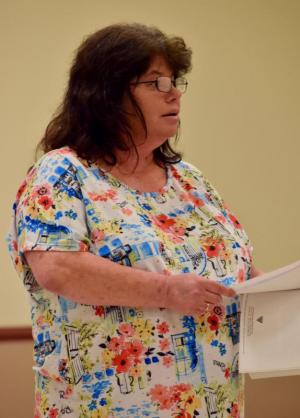Residents: Don't approve Mountaire expansion
.jpg)
Millsboro residents say Mountaire Farms has not been a good neighbor and shouldn't be permitted to expand productions at its plant on Route 24.
At a public hearing Aug. 31, Possum Point resident Jay Meyer said, “All you guys and the people from Mountaire all live in your little castles far away from this stuff, but when you have to smell this garbage day-in and day-out, it's just not fair.
“You want to add another line and it's going to do nothing more than probably increase the smell even more,” he added. “It's enough to make you want to vomit.”
Mountaire officials are seeking a Coastal Zone Act permit to construct a 5,300-square-foot addition that would allow the plant to add a third picking line and increase production by about 18 percent. About 20 residents, including Meyer, complained about the odor emanating from the plant, as well as the quality of wastewater sprayed onto nearby fields.
The $14 million expansion would result in processing an additional 360,000 birds per week at the facility, which now processes about 2 million chickens weekly. In a previous interview, company spokesman Michael Tirrell said the company's plan is to initially increase production by 150,000 birds per week and gradually work up to the full 360,000 birds.
Because the plant falls in the Coastal Zone, an area protected from heavy industry along Delaware's coastline, the proposed expansion must be approved by state environmental officials through a Coastal Zone Act permit.
During the hearing, Robert Haynes of the Department of Natural Resources and Environmental Control agreed to extend the public comment period through Friday, Sept. 15.
Maria Payan, of the Socially Responsible Agricultural Project, asked for the extension to review emails related to the permit application between officials at DNREC and Mountaire. She said Mountaire's record of violations, including a 2003 consent order that prompted the company to provide clean water to nearby residents after the Environmental Protection Agency found groundwater contamination, should be enough for regulators to deny the permit.
“There's a reason for the embarrassing water quality in this state,” she said at the hearing. “We will never restore it with a business-as-usual attitude that reflects poor leadership and decision-making.”
In the permit application, Mountaire estimates wastewater output will increase by about 100,000 gallons per day, or about 4 percent of its current 2.3 million gallon-per-day discharge. Mountaire's permit application also shows the company plans to install a new 150,000-gallon flow-equalization basin to further treat raw wastewater from the plant.
The company treats sanitary sewage and chicken-processing water on site, and then uses the treated wastewater to irrigate more than 900 acres of farm fields surrounding the plant.
Several residents at the public hearing questioned whether the estimated 4 percent increase in wastewater was correct, considering the company plans to increase production by 18 percent.
Preston Wise, who lives on Herbert Lane just west of the plant and its spray fields, said he's always worried if the wastewater is properly treated in the first place.
Wise and his neighbors – all relatives who inherited property from their grandparents, Herbert and Florence Burton – have largely avoided drinking water from their on-site wells since they moved there in the early 2000s.
“I have no problem with jobs, but when you start putting jobs before somebody's health, I've got a problem with that,” he said.
A few residents on Herbert Lane, however, have sipped the tap water over the years. The day after the hearing, Wise and his relatives said they worry whether gastrointestinal problems, cancer and even seizures suffered by Wise's pregnant niece may be related to the high level of nitrites and nitrates the EPA found in their drinking water more than a decade ago.
“Since we've been here, it's been nothing but problems with Mountaire,” said Patsy Taylor, who lives two doors down from Wise.
A large case of bottled water always sits near the kitchen, next to a few jugs Taylor said she will use as cooking water. The windows were closed as they always are, she said – both Taylor and Wise said they never let the breeze in because of the smell from the nearby plant.
Each month, a truck rumbles down the dirt lane to deliver three 50-pound bags of salt for the water softener Mountaire supplied Taylor with following the 2003 consent order. Even though she has that, and a filter on her sink, Taylor said she still won't drink from the tap.
“They're talking about hiring people while they're damaging our health,” Taylor said, adding that the spray rigs come so close to Herbert Lane the water often sprays her own lawn and car. “They don't care about our health.”
Mountaire's Selbyville plant, which is about 12 miles south of the Millsboro facility, has faced numerous wastewater-related violations in the past, including a complaint and consent decree in 2015 that resulted in a $48,000 fine, related to wastewater effluent limit violations dating back to 2011.
Meanwhile, the Millsboro plant was cited for excess ammonia emissions in 2012 and for installing an emergency generator without a permit in 2016.
Because the proposed expansion will require running the boilers more often, company officials expect air emissions will increase.
The Coastal Zone Act requires Mountaire to offset any additional pollution created by the expanded manufacturing activities.
In 2009, the plant converted two boilers from oil to natural gas in an effort to reduce air pollution. The conversion earned the company over 40 tons per year worth of reserve credits, which can now be applied. The proposed expansion is expected to add three tons per year of air emissions from burning natural gas; the company will use 3.9 tons from its 41-ton reserve.
Mountaire currently emits more than 145 tons per year, data included in the permit show.
Mike Teichman, an attorney with Parkowski, Guerke & Swayze representing Mountaire at the hearing, also emphasized the expected economic impacts of the expansion. The project is expected to create 177 new jobs at the plant, and employ about 150 people during construction, he said.
To comment on Mountaire's application, email Kevin Coyle at Kevin.Coyle@state.de.us or Robert Haynes at Robert.Haynes@state.de.us.
Editor’s note: Patsy Taylor’s name has been corrected in this article.


























































